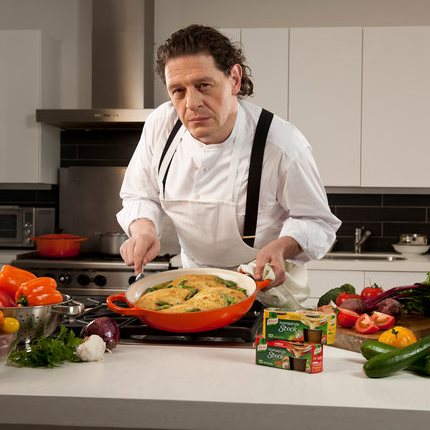With pressure at an all-time high in today’s foodservice kitchens, there’s no shame in embracing pre-prepared food products, a group of leading chefs said at a recent industry event.
Unilever Food Solutions hosted an industry panel recently, discussing key issues in the sector including staffing, cost of goods and the stigma often associated with convenience products like prepared stocks, boosters and ready-made condiments.
The consensus was clear: convenience products have a place in modern day foodservice businesses, and in reality, you’d be hard pressed to find a commercial kitchen that didn’t have at least one such product on hand, they said.
Kurt von Buren, executive chef Mercure Hotel Parramatta, doesn’t have a problem with encouraging the chefs in his kitchen to use convenience products in their day-to-day work.
“Back in the day, we had six apprentices, we had 20 to 30 chefs in each hotel on average, we had production chefs everywhere,” he said. “Now, we do a function with two chefs, for 130 people or more … I remember how we did it, it was a great time, but now it’s a different time and we’re happy to have these products. We need these products.
“It’s not a crime to use them. A lot of chefs think you’re not allowed to use finished products, but I think it’s really hard with less staff and less time to make a stock or sauce without any help.”
Sam Burke, business manager, foodservice, and corporate chef at Meat and Livestock Australia, agrees. Apprentices today haven’t been armed with the same training as those from previous generations, he said, and this skill gap, combined with the rising cost of food and staff, means convenience products are a necessary part of the kitchen’s arsenal.
“Back in the early 90s, when I was at Ryde Tafe, we got smashed in the kitchen to make sure that all the sauces, all the roux were right. We did nine weeks of butchery, and when you came out you understood the basic fundamentals of French cooking,” he said. “Today, there are some great organisations out there, like Le Cordon Bleu, that are doing fantastic things, but the poor old Tafes have had the programs scaled back so much that the chefs aren’t coming out with the same Cert 3 or Cert 4 that they had when we went through college.
 Chefs should know how to make the basics before using convenience products. Image:
Chefs should know how to make the basics before using convenience products. Image:
“So now, we’re relying more than ever on these products to assist in providing a menu item that is good quality time and time again. Because customers want consistency; they want a good variety on the menu and they want to make sure that when they come they’re satisfied, because they’ve parted with their hard earned dollars.”
Products shouldn’t replace skill
Enjoying the speed and efficiency that some convenience products provide doesn’t make your culinary skills obsolete, says Gary Johnson, national food manager at Spirit Hotels. Chefs are naturally creative people, so it’s important to allow them to take ownership of what they’re serving up, he said.
“These guys don’t want to know about opening up a packet and putting it on a plate. They don’t want to know about microwaving things, they don’t want to know about anything like that because of their creative veins. Obviously they want to own the product at the end of the day, and [they want to] put things on a plate that they can put their name behind and be proud of.
“So we take things like, for example, the hollandaise sauce and we put a little bit of butter into it, add a few drops of tabasco, a couple of drops of worcestershire sauce or whatever, and hey presto, there’s a different flavour.”
Von Buren says convenience products should only be used by chefs who are confident that, if need be, they could create the stock or sauce, for example, from scratch.
“My philosophy is always to use it, but don’t misuse it. When I did my apprenticeship, all this stuff was around already in Switzerland and we were not allowed to use it until we could actually cook it. So, for instance, you’d make a chicken stock. If you can do a really good chicken stock and the flavours are right – if you can prove yourself – then you can start to use the powder. Otherwise, apprentices use the powder from the beginning and at the end they still don’t know how to make a chicken stock.
“I think that’s one of the fundamentals that we got taught: you can use it, but first you have to know how to make it.”
At the culmination of the panel discussion, Harry Brouwer, executive vice president for Unilever Food Solutions said that while more works need to be done to get chefs on-board, the assumption that convenience products are poor quality or an indication of laziness is certainly abating.
“We need to think more about how we can change this perception … but just a few weeks ago I was in Istanbul and I was with the chairman of the chefs’ association in Turkey, and he showed me around the hotel [we were visiting] and we came to the restaurant, which was very nice, very luxurious, great presentation, and in this open kitchen, against the wall were Knorr products. I said to him ‘You don’t mind showing these products here? You’re creating such a [high end] image with this restaurant.’ And he said ‘Harry, we’re in 2015. That’s all I’d like to say about it. I show that I’m using Coke, I show the beer brands, why can’t I show that I’m using high quality products?”

